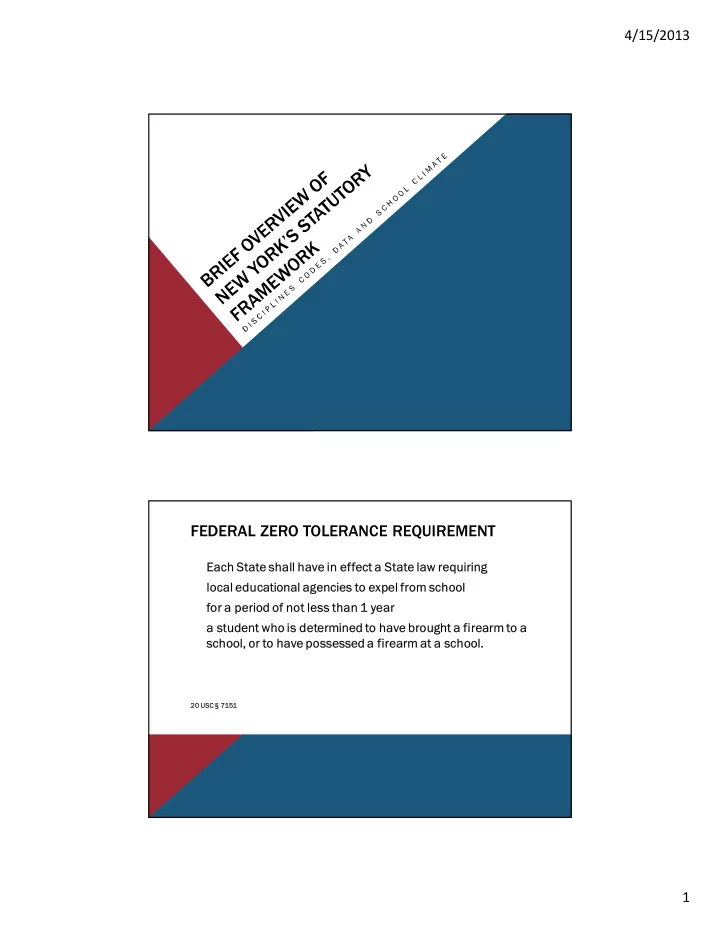

4/15/2013 FEDERAL ZERO TOLERANCE REQUIREMENT Each State shall have in effect a State law requiring local educational agencies to expel from school for a period of not less than 1 year a student who is determined to have brought a firearm to a school, or to have possessed a firearm at a school. 20 USC § 7151 1
4/15/2013 FEDERAL ZERO TOLERANCE REQUIREMENT EXCEPTION: State law shall allow modification of the one year expulsion requirement for a student on a case-by- case basis. 20 USC § 7151 FEDERAL DEFINITION OF FIREARM FIREARM means Any weapon (including a starter gun) which will or is designed to or may readily be converted to expel a projectile by the action of an explosive; The frame or receiver of any such weapon; Any firearm muffler or firearm silencer; or Any destructive device. 18 USC § 921 2
4/15/2013 FEDERAL DEFINITION OF FIREARM DESTRUCTIVE DEVICE means Any explosive, incendiary, or poison gasBomb • Grenade • Rocket • Missile • Mine 18 USC § 921 CONSEQUENCES OF BRINGING A WEAPON TO SCHOOL IN NEW YORK Suspension Any student who is determined to have brought a weapon to school shall be suspended for a period of not less than one calendar year. Case by case review can lessen. Education Law § 3214 (effective 6/30/13) 3
4/15/2013 CONSEQUENCES OF BRINGING A WEAPON TO SCHOOL IN NEW YORK Referral for Prosecution A superintendent shall refer : • any student under 16 who has been determined to have brought a weapon to school to a presentment agency for a juvenile delinquency proceeding • any student 16 or older or a student 14 or 15 years of age who qualifies for juvenile offender status who has been determined to have brought a weapon to school to the appropriate law enforcement officials. Education Law § 3214 (effective 6/30/13) DEFINITIONS VIOLENT PUPIL …an elementary or secondary student under twenty-one years of age who: (1) commits an act of violence upon a teacher, administrator or other school employee; (2) commits, while on school district property, an act of violence upon another student or any other person lawfully upon said property; Education Law § 3214 4
4/15/2013 DEFINITIONS VIOLENT PUPIL cont. (3) possesses, while on school district property, a gun, knife, explosive or incendiary bomb, or other dangerous instrument capable of causing physical injury or death; 4) displays, while on school district property, what appears to be a gun, knife, explosive or incendiary bomb or other dangerous instrument capable of causing death or physical injury; Education Law § 3214 DEFINITIONS VIOLENT PUPIL contd. (5) threatens, while on school district property, to use any instrument that appears capable of causing physical injury or death; (6) knowingly and intentionally damages or destroys the personal property of a teacher, administrator, other school district employee or any person lawfully upon school district property; or (7) knowingly and intentionally damages or destroys school district property. Education Law § 3214 5
4/15/2013 DEFINITIONS DISRUPTIVE PUPIL …an elementary or secondary student under twenty-one years of age who is substantially disruptive of the educational process or substantially interferes with the teacher's authority over the classroom. Education Law § 3214 DEFINITIONS School delinquent. A minor under 17 years of age, required to attend school, who is an habitual truant from such instruction is irregular in such attendance insubordinate disorderly disruptive violent during such attendance Education Law § 3214 6
4/15/2013 DEFINITIONS REPEATEDLY SUBSTANTIALLY DISRUPTIVE of the educational process or substantially interferes with the teacher's authority over the classroom shall mean: Engaging in conduct which results in the removal of the student from the classroom by teacher(s) on 4 or more occasions during a semester, or 3 or more occasions during a trimester, as applicable. Education Law § 3214 WHO MAY BE SUSPENDED? A student who is insubordinate or disorderly or violent or disruptive, or whose conduct otherwise endangers the safety, morals, health or welfare of others may be suspended. A violent student is subject to a minimum suspension as determined by the local school board. Education Law § § 2801, 3214 7
4/15/2013 WHO MAY BE SUSPENDED? A student who is repeatedly substantially disruptive is subject to a minimum suspension period as determined by the local school board. Education Law § § 2801, 3214 DIGNITY FOR ALL STUDENTS ACT The Dignity Act emphasizes and requires creation and maintenance of a positive learning environment for all students. In addition, development of measured, balanced, and age appropriate responses to the discrimination and harassment of students by students and/or employees on school property, school functions, with remedies and procedures focusing on intervention and education. Chapter 482 of the Laws of 2010 8
4/15/2013 DIGNITY FOR ALL STUDENTS ACT Remedial responses : should place the focus of discipline on discerning and correcting the reasons why discrimination and harassment occurred. should also be designed to correct the problem behavior, prevent another occurrence of the behavior, and protect the target of the act. Chapter 482 of the Laws of 2010 DIGNITY FOR ALL STUDENTS ACT Remedial measures may include, but are not limited to: peer support groups; corrective instruction or other relevant learning or service experience; supportive intervention; behavioral assessment or evaluation; behavioral management plans, with benchmarks that are closely monitored; student counseling and parent conferences. Chapter 482 of the Laws of 2010 9
4/15/2013 Kathleen R. DeCataldo, Esq. Executive Director New York State Permanent Judicial Commission on Justice for Children 150 State Street Albany, NY 12207 518-285-8780 pjcjc@nycourts.gov 10
Recommend
More recommend